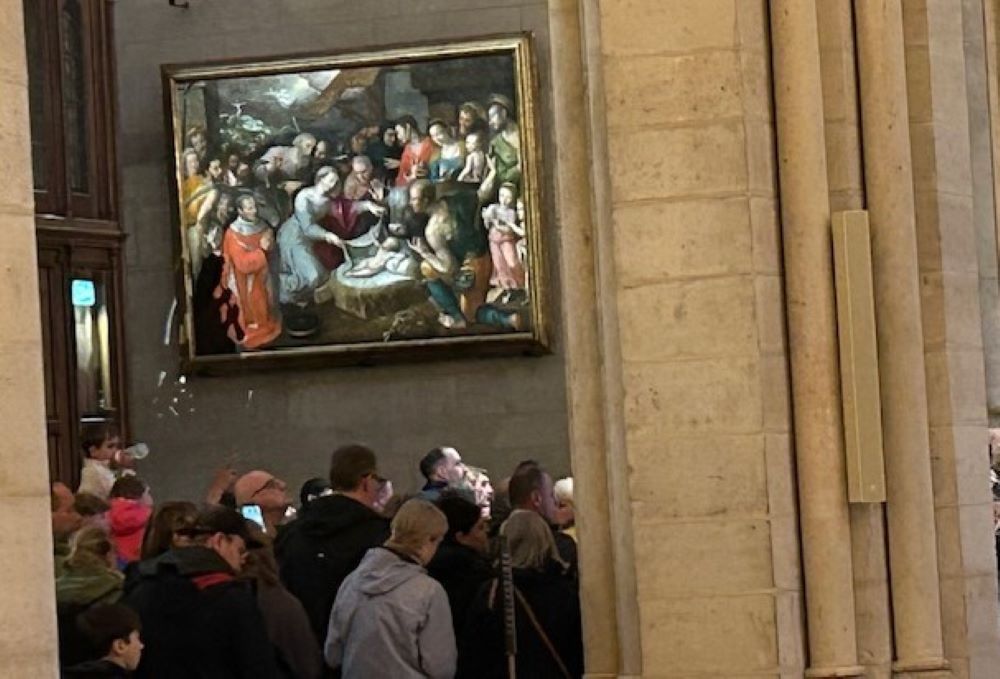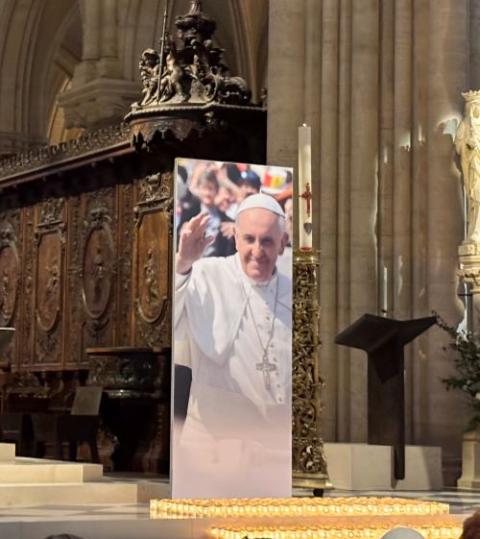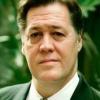
Mass attendees fill Notre-Dame de Paris on April 23, two days after Pope Francis died at age 88. The painting is "The Nativity" (1585) by Jérôme Francken. (NCR photo/Jason Berry)
Three hours after the Vatican announced that Pope Francis had died on April 21, the bells of Notre-Dame de Paris, the cathedral majestically restored after an epic fire, tolled 88 chimes in slow tempo, marking each year of the pope's life.
"I think it's very mysterious to experience the death of a pope during Easter week," Fr. Laurent Stalla-Bourdillon, a Paris priest told BFMTV, as long lines of people filed into the cathedral for a noon Mass.
"I almost feel like telling you that his death sends us back to the message he served," Stalla-Bourdillon.
That message of radical mercy, embracing the margins of humanity, and a tireless quest for peace while promoting a green planet, resonated through the evening hours of back-to-back programming April 21 on French outlets known for saturation coverage on the death of major national and global figures.

A large photograph of Pope Francis stands beside the lectern at Notre-Dame de Paris during Mass April 23. Historically Catholic France is about 29% Catholic today. (NCR photo/Jason Berry)
On April 23, the Notre-Dame high Mass at capacity displayed a larger-than-life photograph of Francis beside the lectern. The liturgy with five white-robed celebrants and a mellifluous choir matched the stained-glass radiance of windows behind the altar. People from Portugal, South Korea, Cambodia and France sat in our cluster. A Frenchwoman told her young daughter, asking about the man in the picture. "Like Jesus, a king for all the people."
Historically Catholic France is about 29% Catholic today, according to the French National Institute of Statistics and Economic Studies, about 8% of whom attend Mass regularly.
Yet the Catholic imprint, so vivid in the churches and street names, reflect France's historic ties to Rome. That reach of historical memory shaped the papal homage in media coverage. Francis' call for welcoming migrants touched nerve tissues of a country where the hard-right National Rally party has fired its followers against migrants and Black citizens from African countries. France is 10% Muslim, according to the French National Institute of Statistics and Economic Studies.
The French policy of secularism, called la laïcité, forbids public displays of faith in schools, such as burkas for girls, while giving substantial support for Catholic schools, some of which educate young Muslims.
"The pope was a man with human sensibilities who was right about so many things without being righteous," said Robert Assaf, an American long residing here whose Corporate Editions firm does translation and copywriting work.
"He stood up for humanity and against great powers doing wrong, or evil," Assaf said. "He also helped to 'modernize' the church. Some among people close to me say he went too far. Many believe he could or should have done more. I believe he was a great man."
Advertisement
American Catholics have viewed Francis through a prism shaped by an immigrant church that has achieved affluence and power since the 1960s, offset by the battering impact of the clergy abuse crisis. France, too, has been jolted by a wave of scandals which received passing mention in media reports on the pope's death.
Francis' relationship with French president Emmanuel Macron, who attended a Jesuit school, was warm, according to reports.
"Macron, who often openly mocks the destitute and the unemployed, urging them to stop bellyaching, to be thankful for their lot and take any job available, is a representative of a neoliberal system that Pope Francis deplored," American-born and Georgetown University graduate John Monahan, a longtime Paris resident, who worked at Ecole Nationale de l'Administration and Sorbonne University, told NCR. "On his visits to the Vatican, Macron, no stranger to showboating, used the familiar 'tu' with the pope. During that audience and others, Pope Francis kept a genial distance."
Yet the Argentine pope, who never returned to his native country, made three visits to France, none of which included Paris as a formal state visit. Francis instead went to Strasbourg for a meeting of the European parliament, to the island of Corsica and to Marseilles, the sprawling Mediterranean port city with a large population of African migrants.
The first pope to visit the United Arab Emirates (with 900,000 Catholics, mostly refugees from India and the Philippines) he cited the famine spread by war in Yemen. The population is "exhausted by the lengthy conflict and a great many children are suffering from hunger," Francis said in 2019. "The cry of these children and their parents rises up to God."
Martin Dumont, general secretary of Sorbonne University's Institute for Research into Religious Studies, in an email interview said that Francis will be remembered "for his commitment to ecology as an essential part of his pontificate" — in the encyclical, Laudato Si'.
Dumont said that Francis' "pastoral overtures toward LGBT+ people and 'irregular couples' is more delicate and have been received rather coolly. It will take a long time for this 'inclusive' approach, balancing Catholic doctrine and a pastoral discourse, to be accepted."
The same might be said of America and other countries where cultural shifts drive political and social divisions. As an April 22 Le Monde editorial pointed out, Francis was "marked by an intense will to move the priorities of Europe toward the greater world — in his address to other religions and nonbelievers and those who have left their faith, and to free the institutional church from its deepest ills."







